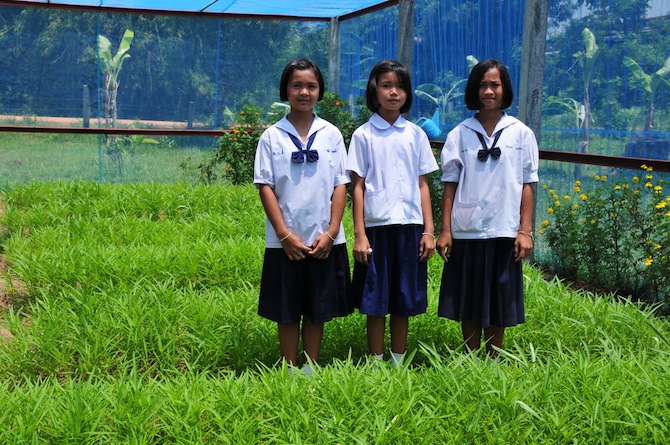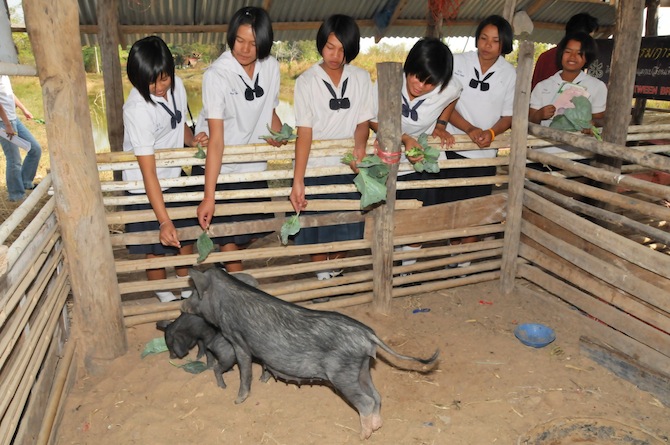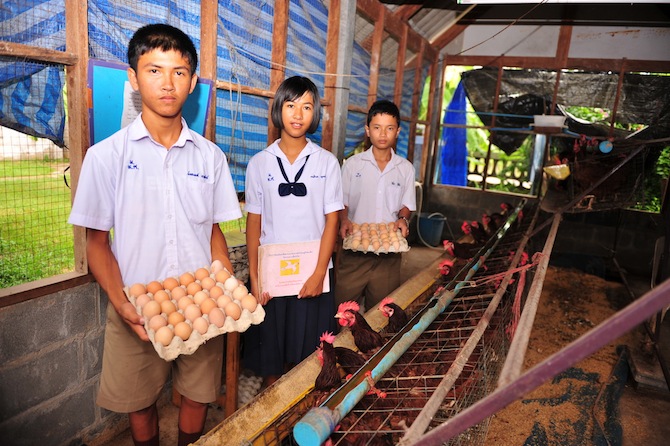
One School One Project
One School One Project (OSOP)
This project supports each school in rural Thailand to start its business independently in which the students learn how to take advantage local techniques and resources in each community.
The northeast area of Thailand is called "Isan" and is considered synonymous with poverty. Though 70% of the population in this region works in agriculture, their cash earnings are low due to agriculture highly depending on the weather and poor soil. More than a few people emigrate from home to the cities in search of employment.
According to data obtained by EDF-Thai, both parents emigrate for at least one out of every five students who applied for the Darunee scholarship between 2001 to 2005. If the members of a family in financial difficulty live apart from each other, the children in the family tend to suffer from poor diet and malnutrition. Without enough food, the students' physical strength deteriorates, the concentration on their studies at school is lost, and educational achievement drops. Statistics taken by the Thai government show that 7-9 of the worst rated provinces in terms of malnourishment are in the northeast area where we operate (Total: 79 provinces in Thailand).
Considering the situation described above, EDF-Japan initiated the project named "OSOP" in 2004 so that students can learn how to take advantage of local techniques and resources in each community in order to start independent businesses at each school for the future independence of the village.

How it works:
This project supports each school in rural Thailand to start its business independently in which the students learn how to take advantage local techniques and resources in each community.
The northeast area of Thailand is called "Isan" and is considered synonymous with poverty. Though 70% of the population in this region works in agriculture, their cash earnings are low due to agriculture highly depending on the weather and poor soil. More than a few people emigrate from home to the cities in search of employment.
According to data obtained by EDF-Thai, both parents emigrate for at least one out of every five students who applied for the Darunee scholarship between 2001 to 2005. If the members of a family in financial difficulty live apart from each other, the children in the family tend to suffer from poor diet and malnutrition. Without enough food, the students' physical strength deteriorates, the concentration on their studies at school is lost, and educational achievement drops. Statistics taken by the Thai government show that 7-9 of the worst rated provinces in terms of malnourishment are in the northeast area where we operate (Total: 79 provinces in Thailand).
Considering the situation described above, EDF-Japan initiated the project named "OSOP" in 2004 so that students can learn how to take advantage of local techniques and resources in each community in order to start independent businesses at each school for the future independence of the village.

How it works:
- To learn manufacturing using local resources and traditional techniques. The students learn manufacturing methods* taking advantage of local resources and traditional techniques from specialists and local farmers gathering at the school. In the long term, what they learn will bring them financial independence, reverse depopulation trends, and contribute the further development of the community.
Note*: Methods include organic farming growing vegetables and fruits; pig farming; fish or frog farming; making and selling fruit juice drinks; making paper using elephant feces; weaving cloth using banana tree stems; producing product made of concrete such as tables; et cetera.
- Serving free lunch at school to promote good health. Free lunch is served at school using agricultural products produced by OSOP or by using business related earnings to promote good health. As a result, school attendance is improved and the dropout rate has decreased, effecting better learning.
- Improving communication skills and a sense of responsibility. Working together grows a sense of responsibility on the job and communication skills in the students. Also a part of the earnings from selling products produced by the project will help offset the cost of school supplies thereby reducing education costs for each family.

Should you be interested in supporting this project, please kindly contact us through the below inquiry form for more information
THEIR FUTURE IS IN YOUR HANDS
SUPPORT A STUDENT
